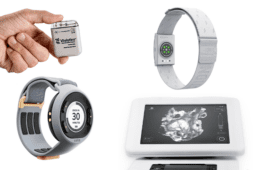Exactech, Inc. (Nasdaq: EXAC), a developer and producer of bone and joint restoration products for hip, knee, shoulder, spine and biologic materials, announced today first implantations of a new hip replacement system designed to preserve a key portion of patients’ bone in total hip arthroplasty procedures.1,2 The Exactech LPI Prime hip system is a more conservative treatment option, designed for maintaining the maximum amount of proximal femoral bone while providing excellent initial stability, enabling biological fixation.3 The geometry of the stem is designed to facilitate insertion through smaller incisions.
The LPI Prime system includes specialized instrumentation contained within one tray, designed for efficiency in any surgical approach.
“The materials and methods used in hip replacement have improved dramatically over the last two decades,” said orthopaedic surgeon and Exactech CEO Bill Petty, MD. “The LPI Prime system is one of those engineering advances; it is designed to meet the growing demand for conservative treatments that make it possible for patients to stay active longer, since many patients are being treated at younger ages.” Orthopaedic surgeons John Aldridge, MD, at Mary Immaculate Hospital (Newport News, VA) and Scott Dunitz, MD, at Tulsa Bone and Joint Associates (Tulsa, OK) recently performed the first surgeries using the new hip system and report excellent experiences with the implants and instrumentation.
According to Dr. Dunitz, “The new implant saved more healthy bone compared to other implant designs I have used. The design allowed me to use a more minimally invasive approach, and I was impressed that it provided the stability of a traditional hip implant.” Dr. Aldridge reported that he was able to restore his patient’s natural anatomy, which can be a challenge in certain anatomies. “I am very pleased with the new hip implant geometry,” he said. “The stem’s size and design minimized disruption to soft tissue, and my patients are able to return to active mobility quickly – an important goal of hip replacement.” The initial launch of the new system is underway in the United States, with full market release planned in 2014. The LPI Prime system joins Exactech’s recently launched InteGrip® material as the company’s latest innovations in hip arthroplasty.
Orthopaedic surgeons who want to learn more about the new implants and the latest techniques in hip replacement can take advantage of Exactech’s personalized medical education programs. Surgeons can design the workshop that best meets their individual preferences including live surgery observation, hands-on courses, hospital in-service programs or in-depth technical review with Exactech staff at the corporate headquarters.
About Exactech
Based in Gainesville, Fla., Exactech develops and markets orthopaedic implant devices, related surgical instruments and biologic materials and services to hospitals and physicians. The company manufactures many of its orthopaedic devices at its Gainesville facility. Exactech’s orthopaedic products are used in the restoration of bones and joints that have deteriorated as a result of injury or diseases such as arthritis. Exactech markets its products in the United States, in addition to more than 35 markets in Europe, Latin America, Asia and the Pacific. Additional information about Exactech, Inc. can be found at http://www.exac.com. Copies of Exactech’s press releases, SEC filings, current price quotes and other valuable information for investors may be found at http://www.exac.com and http://www.hawkassociates.com.
An investment profile on Exactech may be found at http://www.hawkassociates.com/profile/exac.cfm. To receive future releases in e-mail alerts, sign up at http://www.hawkassociates.com/about/alert.
References
1 McElroy MJ et al. Short and standard stem prostheses are both viable options for minimally invasive total hip arthroplasty. 2011;69 Suppl1:S68-76.
2 Data on file at Exactech (711-68-30 LPI Prime Femoral Stem Operative Technique).
3 Data on file at Exactech (TR-2013-036 and TR-2013-037).* *Laboratory tests are not necessarily predictive of clinical outcomes.




